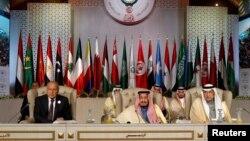Arab solidarity and joint efforts to confront political and economic crises were the main topics of discussion at the 30th annual summit of Arab leaders Sunday in the Tunisian resort town of Carthage. Iranian behavior across the region, along with the Israeli-Palestinian conflict and the Syrian crisis were also major topics of debate.
Arab leaders discussed the key topics facing the region and their own countries in the televised session of the annual summit Sunday, in the Tunisian resort town of Carthage. Arab media spoke of discord over several key issues, after Qatar's leader Sheikh Tamim and Jordanian King Abdallah II left the summit early.
Saudi King Salman told the gathering the top issues confronting the region are Iranian meddling in the affairs of many Arab states, as well as the unresolved conflict in Syria.
He says Iran's aggressive (regional) behavior represents a threat to international agreements and must be dealt with by the international community. He adds the recent U.S. decision to recognize Israeli sovereignty over the Golan Heights highlights the need for a solution to the Syrian conflict that guarantees the country's unity.
Egyptian President Abdel Fattah el-Sissi stressed the urgent need to address terrorism.
He says Arab states are facing a critical juncture and must make a concerted effort to combat all forms of terrorism, and its underlying ideology, which kills the innocent, opposes religious beliefs, and ignores principles of human rights. Terrorism, he says, threatens the unity of all Arab states and they must work together to combat it.
Iraqi President Barham Salih said "no Arab state should think itself immune to the threat of terrorism," and stressed his country paid a heavy price to "achieve victory over it." He criticized the selfish interests of many Arab states and pledged cooperation.
He says the main principle of Iraq's relations with its Arab and Islamic neighbors is that it won't enter into alliances with anyone, but will work towards the common good and mutual interest of all parties.
Palestinian leader Mahmoud Abbas presented a litany of grievances against the United States and Israel. He denounced U.S.-recognition of Jerusalem as Israel's capital, the closure of the Palestinian diplomatic mission in Washington, and cuts in U.S.-funding to UNWRA, which provides schooling and health care for many Palestinians. He also blamed Israel for withholding funding to the Palestinian Authority and condemned it for occupying Palestinian land.
Lebanese President Michel Aoun blasted U.S. recognition of Israeli sovereignty over the Golan Heights, insisting that "small states like Lebanon feel vulnerable when larger states do not respect international law." Aoun also expressed Lebanon's concern over the settling of Palestinian and Syrian refugees on its soil, urging they be allowed to return home.




